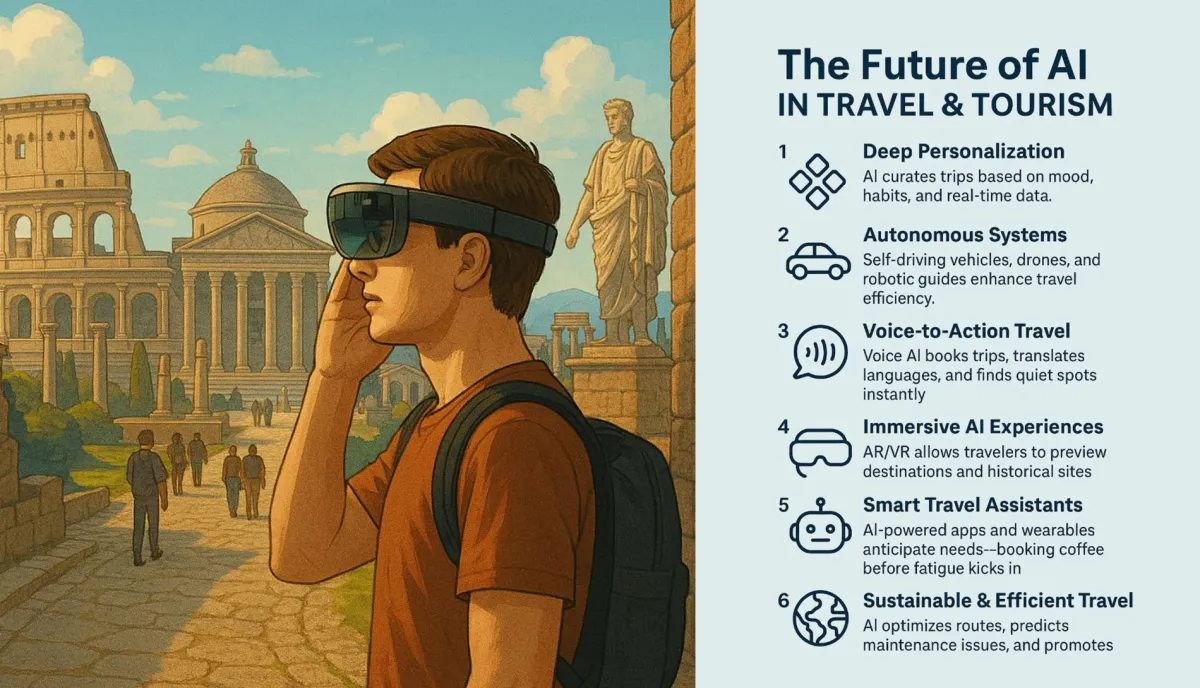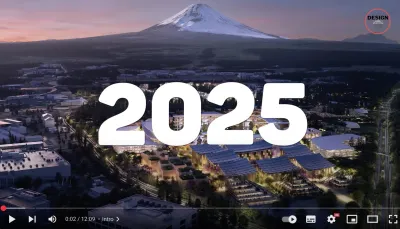Travel and tourism industry
ChatGPT
Autonomous Systems
Emotional Intelligence
Voice-activated AI
Sustainable Choices
Sustainable Tourism
AI in Travel and Tourism: The Journey Ahead. Every week something new.

Travel and tourism industry
ChatGPT
Autonomous Systems
Emotional Intelligence
Voice-activated AI
Sustainable Choices
Sustainable Tourism
Artificial intelligence continues to reshape the travel and tourism industry, and its rapid evolution shows no signs of slowing down. From ChatGPT’s recent image generator to futuristic travel companions, AI is blending enhanced user experiences, operational efficiencies, and entirely new ways to explore the world. Here’s a look at what’s on the horizon—and the innovative possibilities that stretch beyond today’s advancements.
What’s Next for AI in Travel?
AI is poised to transform how we plan, experience, and even imagine travel:
- Deep Personalization: Forget basic suggestions like “You liked Paris, try Rome.” AI will craft deeply tailored experiences using real-time data—think mood analysis from wearables, past travel habits, and social media vibes.
- Autonomous Systems: Self-driving vehicles, drones, and robotic guides will handle logistics seamlessly, from airport transfers to luggage delivery.
- Multimodal Interaction: Imagine an AI travel buddy that combines voice, text, visuals, and gestures—scanning your surroundings to suggest a hidden café or a scenic detour.
- Emotional Intelligence: AI that reads your stress levels could tweak plans on the fly, swapping a busy itinerary for a spa day.
- Synthetic Worlds: Advanced AR/VR will let you “test-drive” destinations or step into historical eras before booking your trip.
Voice-to-Action: Travel at Your Command
Voice-activated AI is making travel faster and frictionless—perfect for juggling bags or navigating unfamiliar streets:
- Instant Itineraries: Say, “Plan me a chill weekend in Tokyo,” and your AI books flights, reserves a hotel, and schedules a sushi-making class—all hands-free. It might even detect exhaustion in your tone and add a rest day.
- Real-Time Guidance: A voice-activated earpiece could translate languages instantly, explain cultural quirks, or haggle with vendors (“Get me a better price on this scarf”).
- Dynamic Navigation: Tell your AI, “Take me somewhere quiet,” and it reroutes you to a serene park based on live noise data.
- Hassle-Free Everything: Voice commands streamline payments, updates, and post-trip feedback, keeping your journey smooth from start to finish.
The real magic? Blending voice with emotional awareness and predictive analytics for a travel experience that feels almost telepathic.
Beyond Voice: AI’s Next Frontier
AI’s potential stretches far beyond spoken commands:
- Travel Companions: A virtual assistant (via phone or smart glasses) anticipates your needs—ordering coffee before you crash or warning you about a crowded train based on social media posts.
- Predictive Packing: An app scans your trip details—weather, events, duration—and syncs with a smart suitcase to ensure you’ve packed right.
- Emotion-Driven Adventures: Bored on a layover? Wearables detect it, and your AI books a nearby VR lounge or a quick local escape.
- Sustainable Choices: Real-time carbon tracking suggests greener routes—like a train over a flight—while balancing cost and time.
- Crowd Avoidance: Using web and social media data, AI predicts peak times at attractions and guides you to quieter gems.
Gesture-based kiosks, biometric check-ins, and robotic concierges are also emerging, making travel smoother, smarter, and more inclusive.
Your AI Trip Planner: Personalized to Perfection
AI is redefining trip planning with tailored recommendations drawn from vast datasets—past trips, preferences, social media, and real-time trends. Platforms like Google Travel, Hopper, and Airbnb already excel here, while newcomers like Wonderplan, Layla.ai, and Mindtrip.ai take personalization further:
These tools don’t just suggest—they anticipate, optimize, and inspire.
|
Platform |
Key AI Features for Personalization |
Unique Selling Points |
|
Google Travel |
Analyzes past trips, budget preferences, social media activity |
Real-time flight status updates, suggestions for alternatives |
|
TripAdvisor |
Leverages user reviews, preferences, travel history |
Millions of reviews and ratings |
|
Hopper |
Predicts flight and hotel prices |
Advice on best time to book |
|
Airbnb |
Matches travelers with accommodations based on preferences and past stays |
Personalized recommendations for local experiences |
|
Skyscanner |
Analyzes user behavior and preferences |
Helps find the best deals |
|
Visits.ai |
Collects destination and preference information |
Fine-tunes recommendations and plans trip with a single click |
|
AI Travel Agent systems |
Uses embeddings and language models |
Generates detailed itineraries with cost estimations |
|
Wonderplan |
Considers unique preferences and tastes |
Generates personalized accommodation recommendations |
|
Tripplanner.ai |
Analyzes explore-sights, dining, and lodging preferences |
Optimizes routes and recommends local cuisine |
|
Layla.ai |
Conversational AI trip planner |
Provides inspiring video content and customizable itineraries |
|
Mindtrip.ai |
Learns user tastes and preferences |
Offers inspiration from other travelers and collaboration tools |
|
Qtravel.ai |
Generates responses to inquiries with personalized offers |
Supports small and medium-sized tourism businesses |
Behind the Scenes: Efficiency and Sustainability
AI isn’t just for travelers—it’s revolutionizing operations:
- Predictive Maintenance: Sensors and algorithms spot aircraft or hotel issues before they happen, cutting downtime and costs.
- Resource Optimization: Hotels automate cleaning, energy use, and kitchen workflows with AI precision.
- Sustainable Tourism: AI optimizes flight paths, promotes eco-friendly stays, and tracks resource use to shrink carbon footprints.
Immersive Worlds and Accessibility
AI-powered VR/AR is turning travel into a sensory adventure—previewing destinations or overlaying real-time info on landmarks. For those with disabilities, voice AI offers hands-free navigation, real-time transcription aids communication, and smart services boost independence.
Customer Service: Your 24/7 AI Assistant
Voice AI is elevating support—handling bookings, answering questions, and suggesting options in any language, anytime. Soon, these assistants will proactively solve problems before you notice them.
The Long-Term View: Opportunities and Challenges
AI promises a future of seamless, personalized travel—but it’s not without trade-offs:
- Upsides: Hyper-tailored journeys, sustainable options, and virtual exploration for all.
- Downsides: Privacy risks, over-reliance on tech, and potential homogenization of experiences.
Experts see AI merging with VR/AR to transcend physical limits, creating entirely new forms of discovery—though balancing virtual and real-world travel will be key.
Conclusion: A Smarter, Bolder Journey
AI is unlocking a travel future that’s more personalized, efficient, and sustainable. By embracing it thoughtfully, the industry can craft journeys that delight and inspire.
At BAE Ventures, we’re excited to connect with startups driving this transformation. The road ahead looks incredible—let’s explore it together. If you are interested in talking to us, please submit your startup here.



